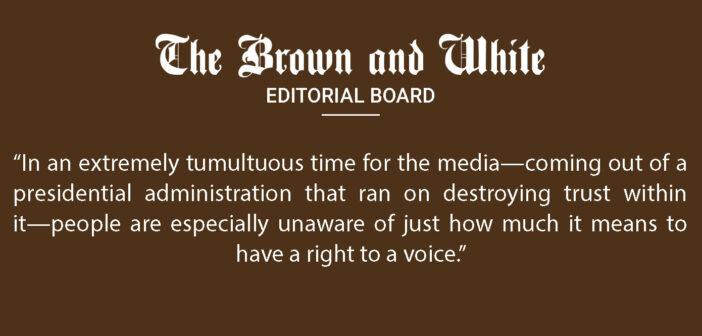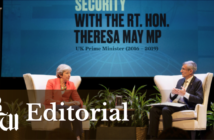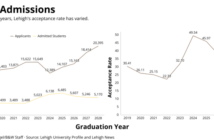A recent intelligence report was released by the Biden administration indicating that the brutal 2018 murder of The Washington Post journalist Jamal Khashoggi was approved by Crown Prince Mohammed bin Salman of Saudi Arabia.
Kashoggi was not one to shy away from the risks of criticizing Saudi Arabian government and did so consistently throughout his career. Right before his disappearance and death, he wrote a column for The Washington Post in which he criticized the policies of the Saudi Arabian Crown Prince.
Khashoggi had travelled to Istanbul on Sept. 28, 2018 to obtain divorce documents so he could marry his Turkish fiancee, Hatice Cengiz.
He entered the Saudi consulate, but never left.
Initially, Saudi Arabia refused to acknowledge Khashoggi’s disappearance, but later claimed that he had died by chokehold in a fight after refusing to return home.
The multi-year investigation has affirmed many of the suspicions relating to his disappearance.
Khashoggi died by premeditated murder. It was ordered by the head of a “negotiations team” sent to Istanbul by the Saudi deputy intelligence to bring Khashoggi back to the kingdom by “means of persuasion,” and if that failed, “by force.”
Investigators concluded that Khashoggi was forcibly restrained after struggling to resist and was injected with a lethal amount of a drug that led to his death. His body was then dismembered with a bone saw.
Khashoggi’s death, while extremely disturbing and upsetting, is an unfortunate fate that many journalists outside the U.S. have to consider as a possibility in their line of work.
What people tend to forget is that not many countries have the First Amendment rights that we do here in America. As written in our constitution, we have a legal right to freedom of speech and right to the press. That in it of itself is an immeasurable privilege.
According to the 2020 World Press Freedom Index, the U.S. is ranked 45 out of 180 countries. Saudi Arabia came in at 170.
Journalists across the globe cannot do their job of reporting on news fairly and objectively because in some cases, they have to choose between that and death.
We, as budding reporters growing up in the U.S., have the privilege of not having to consider how choosing this profession could result in such grave consequences.
In an extremely tumultuous time for the media—coming out of a presidential administration that ran on destroying trust within it—people are especially unaware of just how much it means to have a right to a voice.
It’s the responsibility of the U.S. to stand up for freedom of speech globally, and do more to acknowledge how integral the press is to the functionings of our government.
And it needs to start by coming from the people at the top.
The Trump administration had blocked the release of the intelligence report, and refused to punish the Saudi monarchy, as they are one of the world’s biggest customers for U.S. weapons contractors.
Biden ran on the platform that he was going to create change and try his best to repair the damage done by Trump. Yet, besides releasing the report that should’ve been released when the investigation was conducted, all they have claimed they will do is “recalibrate relations” with Saudi Arabia.
We hope that his complacency and failure to adequately address Khasoggi’s murder is not indicative of what is to come in the next four years.
The U.S. boasts press freedom as a key tenet of democracy, yet stands idly by when those liberties are threatened in other nations. It is the responsibility to the Biden Administration to do what the Trump Administration failed to do: Lead by example, and protect those who are willing to risk their lives for accountability and truth.






Comment policy
Comments posted to The Brown and White website are reviewed by a moderator before being approved. Incendiary speech or harassing language, including comments targeted at individuals, may be deemed unacceptable and not published. Spam and other soliciting will also be declined.
The Brown and White also reserves the right to not publish entirely anonymous comments.
2 Comments
Alas, it is much easier to complain about someone else’s decision than to make the tough decision on your own. Children on the Mexican border are another case where criticizing is a poor substitute for a solution.
God bless our dedicated reporters; be careful out there.
Rereading this editorial, and my comment, with the benefit of close to two weeks of world changes; decisions should be made with an appreciation of the consequences. There is plenty to dislike about the Saudis and how they operate but they give us certain advantages in that part of the world where very few nations woulkd do anything to help us, sad but true.
For all the political talk about the abuse of emigrating Central American children entering the US, little was done or has been done to make the situation better. Shades of Jan 6, 2021, President Biden did not tell them to come but others concluded that he encouraged them to come. Gutless Senators and Representatives refuse to solve the problem (make clear decisions that are enforced) at the behest of bid donors/powerful interests that want cheap labor.
Cheap labor would enhance recycling. Let’s send our trash to a refugee camp in northern Mexico and give citizen ship to one person for every 10 tons of sorted recyclables. Refugees would jump at the chance. I am remembering my visit to Viet Nam in the early 70’s where trash trucks were “attacked” by locals to get the first shot at anything worthwhile. Also there was a very nasty job that was the object of competition in order to obtain a salary.